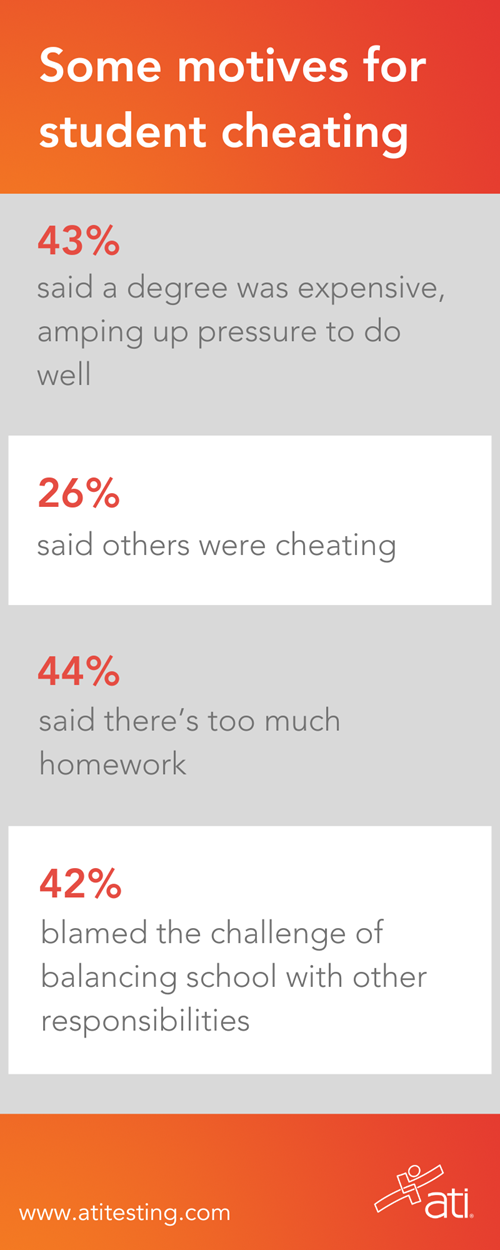What’s the connection between student ethics & assessments?
Transforming assessment practices: Navigating the future of integrity in nursing schools

Inside Higher Education reported that the breach rates of online assessments — in which students looked at “unpermitted resources” (such as textbooks or phones), allowed others to be present, or had another person take the test — were up 7.2% compared to 15 months before the pandemic’s start.
Learn more about test security
The publication also stated:
• Nearly two-thirds of higher-ed students (64.4%) arrived at exams in 2021 with unpermitted resources.
• Proctors had to intervene to prevent potential cheating in nearly 1 in 5 cases (19.1%).
What’s driving the increase? In a survey last year by Wiley, students said the pressure to get a good grade was the most pervasive reason (71%). (Other reported motives are outlined in the boxed information at right.)
WHAT CAN YOU DO RIGHT NOW?
 Christine Mills, PhD, ATI/Ascend Learning Senior Director of Learning and Measurement, says you should create a culture that supports academic integrity and talk about the consequences of cheating.
Christine Mills, PhD, ATI/Ascend Learning Senior Director of Learning and Measurement, says you should create a culture that supports academic integrity and talk about the consequences of cheating.
“Students must understand that cheating not only puts their careers at risk if they’re caught, but they also put future clients’ lives at risk,” she added.
Also key: Implementing an academic integrity policy that emphasizes the importance of assessment integrity and the consequences of cheating.
WHAT ARE THE CONCERNS REGARDING REMOTE PROCTORING OF ASSESSMENTS?
A primary concern centers on personal and data privacy; some individuals have argued the software was intrusive and invaded their private spaces. However, when the National League for Nursing (NLN) performed a student perception survey about remote proctoring, 65% of respondents said they were satisfied or very satisfied with their overall remote proctoring experience. What caused the positive reviews? Students told the NLN authors it was due to “ease of computer setup, availability [and rescheduling] of test appointments, and wait time for proctors to start the exam.“
Among nursing students with concerns, it appeared that some had developed their negative beliefs based on social media. Responding to the NLN survey, several reported that others’ comments worried them that remote proctoring would be a “disaster,” “horrific,” and “unsatisfactory.” However, after experiencing it themselves, the NLN said, “that was not [respondents’] experience.”
WHAT CAN YOU DO RIGHT NOW?
As students continue adjusting to the use of remote proctoring, take steps to ease their concerns. For example:
• Let students know as soon as possible when remote proctoring will take place.
• Explain how your remote proctoring process works. Use simple language and provide links to more detailed explanations.
• Provide guidance on students’ test-taking environment, such as removing or covering personal documents from camera view and reminding others who might intrude by hanging signs that testing is taking place.
Sunny G. Hallowell, PhD, APRN, PPCNP-BC, an assistant professor at Villanova University, said she developed “a simple diagram ... depicting the faculty view of [students] during an online test and used it to demonstrate the expected, correct positioning of their laptop and cell phone to guide how they would set up the learning space for video-conferencing surveillance during a test.” She said her nursing program worked with its technology center to develop written instructions for students.
You can also reassure students that research shows the use of remote-proctoring technology won’t negatively impact their grades. One study noted, “Despite reporting serious concerns about their overall experience with e-proctoring tools (e.g., privacy, environmental, and psychological concerns), the majority of students scored above average on their online exams.”
Dr. Mills advised describing the specific security features of your remote proctoring software to students.
For example, explain that it can:
• Take screenshots of a student’s desktop
• Detect the number of monitors connected to a computer
• Record web traffic during the exam.
However, the technology does not:
• See or collect web-browser information
• Require personal information to access the exam
• Put information at risk. (Remote proctoring firms use encryption processes and secure storage methods.)
WHAT ARE THE CONCERNS ABOUT THE INTEGRITY AND SECURITY OF ONLINE ASSESSMENTS?
 Have you heard from students or other educators that they have seen ATI test answers for sale online? Rest assured: Reality does not justify concerns. Jeff Marsh, Test Security Manager for ATI and Ascend Learning, says, “ATI takes test security concerns very seriously and promptly addresses any suspected test misconduct.”
Have you heard from students or other educators that they have seen ATI test answers for sale online? Rest assured: Reality does not justify concerns. Jeff Marsh, Test Security Manager for ATI and Ascend Learning, says, “ATI takes test security concerns very seriously and promptly addresses any suspected test misconduct.”
Specifically, to safeguard its assessments, ATI uses multiple methods to uncover test cheating and theft:
• Web-crawling processes. Every day, ATI examines the Internet for unauthorized postings of ATI assessment materials and swiftly takes steps to have content removed.
• Analysis and investigation. We investigate every report of ATI test materials that appear to be of an unauthorized or suspicious nature.
• Data forensics. ATI takes proactive, preventive steps to scrutinize data for incongruities or suspicious results.
• Cease-and-desist and take-down notices. ATI sends legal notices to website owners and operators who host fraudulently obtained ATI content to immediately remove the content.
WHAT CAN YOU DO RIGHT NOW?
Your program plays a key role in preventing test cheating. If you’re unsure how, ask your ATI Client Executive/Integration Specialist Nurse Educator for help administering and implementing assessments, gaining proctor certification, and training faculty.
Additionally, your nursing program has the most leverage with students and in enforcing academic integrity policies. Do so by:
• Setting an expectation for honesty among your students. Create an academic integrity policy that emphasizes the importance of assessment security. Your Integration Specialist Nurse Educator can assist you as needed.
• Promoting how crucial your policies and honor codes are — and what will happen if students violate them. Remind students that becoming a nurse practicing with integrity starts with being a nursing student practicing with integrity.
• Making sure that your school follows through on violations with profound consequences for students found cheating or taking part in misconduct regarding assessments.
• Letting us know if you are concerned about information that appears to be ATI test assessments for sale. Send a note to [email protected]. ATI investigates every inquiry.
Some motives for student cheating
43% said a degree was expensive, amping up pressure to do well.
26% said others were cheating.
44% said there’s too much homework.
42% blamed the challenge of balancing school with other responsibilities.
